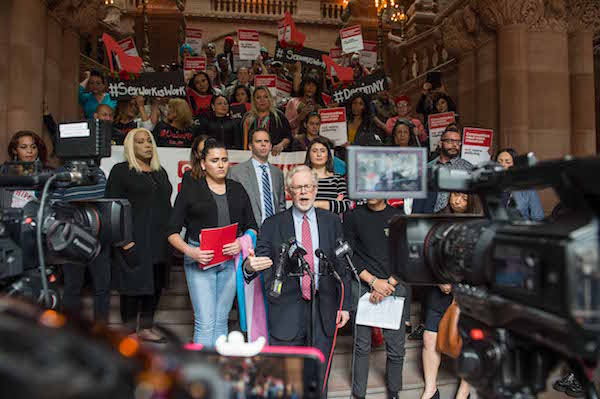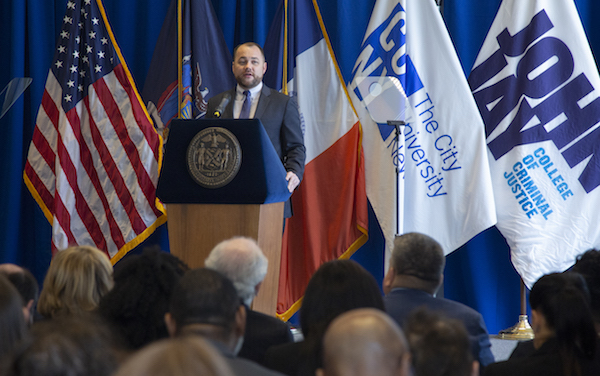
BY WINNIE McCROY | New York legislators are taking steps to protect citizens from laws and policies that penalize marijuana use and criminalize sex work.
The New York City Council recently passed a bill banning prospective employers for testing for the presence of marijuana. And in Albany, legislators are working to expand criminal record relief for sex trafficking survivors, and repeal a ban on loitering that police often use to profile, harass, and arrest transgender people.
“It’s clear that we cannot wait until legalization on the state level before moving to reduce the impact that marijuana prohibition has had on individuals and communities. Testing isn’t a deterrent to using marijuana, it’s an impediment to opportunity that dates back to the Reagan era—a war on drugs measure that’s now a war on workers,” the bill’s sponsor, Public Advocate Jumaane Williams, told Chelsea Community News.
“We need to be creating more access points for employment, not less,” Williams said, “and if prospective employers aren’t testing for past alcohol usage, marijuana should be no different. While New York State deliberates and the federal government continues to prop up stigma and harmful policies, New York City must lead the way on this issue.”
The legislation does not permit people to come to work high or impaired, Williams, a Democrat, said when the bill passed on April 9.
Instead, Intro 1445-A prohibits employers in New York City from requiring prospective employees to “submit to drug testing for the presence of any tetrahydrocannabinols (THC), the active ingredient in marijuana, as a condition of employment, in such prospective employee’s system as a condition of employment. Exceptions are provided for safety and security sensitive jobs, and those tied to a federal or state contract or grant.” This includes jobs like police, bus or truck drivers, and healthcare or childcare workers.
Drug testing is used by about 60 percent of large employers, and cannabis accounts for half of all positive drug test results. This prevents many people from advancing their careers. And legislators argue that such screenings prevent many people from even applying for these jobs. In fact, many companies are moving away for checking for THC, because it shuts qualified applicants out of the labor pool.
The bill still needs to be signed into law by Mayor Bill de Blasio, who has said that the City would support barring employers from denying people employment for testing positive for pot or having prior marijuana arrests. The legislation was returned unsigned by the mayor on May 9, but it was City Charter Rule Adopted on the following day, May 10. De Blasio is expected to sign Intro 1445-A—the first legislation of its kind in the United States—and it will go into effect one year later.

“As we work to legalize marijuana in New York, it is clear that we should not be testing prospective job candidates for a marijuana use, with limited exceptions,” New York City Council Speaker Corey Johnson told CCN.
“The City Council passed legislation to ban this practice,” Johnson noted. “Since it has traditionally disproportionately impacted communities of color, the tests are unreliable—and marijuana use outside of work hours does not speak to a person’s abilities to excel at their jobs, in most instances.”
The legislation is part of a raft of similar marijuana decriminalization legislation.
Last summer, the NYPD announced they would issue criminal summonses instead of arrest to those caught smoking pot in public. The new policy took effect on September 1, 2018, and the NYPD expects this to reduce the overall number of pot arrests by about 10,000 per year.
“Marijuana reform is critical to addressing racial bias and economic inequity across New York. To address disparities in marijuana arrests I carry legislation (S2278) that would seal records of past arrestees, as well as co-sponsor Senator Kreuger’s bill to legalize recreational marijuana (S1527),” said NY State Senator Brad Hoylman. “I am a proponent for reform at all levels of government, and will continue to work with my colleagues in Albany to move the needle forward on this important issue.”
In Albany, Reform Sought to Protect Sex Workers
On May 7, sex workers, trafficking survivors, and advocates from Decrim NY joined elected officials in Albany to advocate for the passage of A654/S2253, the loitering for the purposes of prostitution statue; and A6983/S4981, which expands criminal record relief of survivors of trafficking. New York is leading the legislation, by having amended in 2010 its Criminal Procedure Law to allow survivors of trafficking to vacate their “prostitution-related” convictions.
“Our priorities this year are A6983/S4981, which I sponsor, which will expand the criminal record relief available to trafficking survivors, and A654/S2253, by Assemblymember Paulin, which repeals the ban on loitering for the purpose of prostitution,” said NY State Assemblymember Richard (Dick Gottfried).
“Trafficking survivors should not be treated as criminals,” he said. “New York’s 2010 vacatur statute was a national model, but its limitation to prostitution convictions still leaves too many survivors prosecuted for other offenses that labor and sex traffickers force them to commit.”
In Washington, DC, human trafficking or coercing someone into sex work against their will is also illegal—but proposed legislation by At-Large Councilmember David Grosso would decriminalize prostitution between consenting adults in the District. The Washington Blade reports that the bill calls for repealing all current DC laws that establish criminal penalties for commercial sex work engaged in by consenting adults.
But New York’s A654/S2253 is often dubbed the “Walking While Trans” law, because police often use the legislation to profile, harass, and arrest transgender people for vague offenses, such as “waving at a car” or “wearing a skirt.” This most often impacts transgender women of color.
“The ‘loitering for the purposes of prostitution’ ban, which A654/S2253 will repeal, has long been used to target, harass, and arrest not only sex workers but anyone a police officer decides to profile as one,” Gottfried said. “Repealing this statute is key to protecting the rights of all people, no matter how they look.”
For transgender communities, this furthers economic vulnerability among those who are discriminated from securing other jobs. And for undocumented sex workers, it often means they are rounded up and deported by Immigration and Customs Enforcement (ICE). It leads them into a dangerous cycle of arrests and court appearances in order to access services, with potential jail time if they fail to comply with programs.
“The vacatur expansion bill also makes it clear that it is the victim’s status as a trafficking victim that entitles them to record relief. Victims shouldn’t have to prove that they’ve since sought services in order to ‘earn’ criminal record relief,” Gottfried said. “The vacatur expansion has passed the Assembly the last two years, and I’m hopeful that our new Senate Majority will help us make it law.”
Chelsea Community News is made possible with the help of our awesome advertisers, and the support of our readers. If you like what you see, please consider taking part in our GoFundMe campaign (click here). To make a direct donation, give feedback about the site, or send a Letter to The Editor, email us at Scott@chelseacommunitynews.com.

Pingback: hihuay
Pingback: เทรดทอง
Pingback: เช็คบัญชีมิจฉาชีพ
Pingback: https://www.kentreporter.com/reviews/phenq-reviews-urgent-side-effects-warning-honest-customer-truth/
Pingback: สล็อต pg เว็บตรง แตกหนัก
Pingback: springfield farms carts
Pingback: psychedelic mushroom chocolate bars legal near north carolina
Pingback: simptome cancer pancreas
Pingback: Residual income opportunities
Pingback: chanterelle mushrooms for sale
Pingback: เอสบีโอเบท
Pingback: sbobet
Pingback: passive income
Pingback: sbo
Pingback: เงินด่วน
Pingback: sbo
Pingback: Firearms for sale online
Pingback: redes informaticas
Pingback: mushroom tolerance calculator,
Pingback: prima weight loss
Pingback: hornymilfchat.com
Pingback: breitling replica chrono avenger rubber strap
Pingback: DevOps solution
Pingback: KIU-Library
Pingback: Online Dispensary
Pingback: Mail order 1-p LSD
Pingback: buy dmt online europe
Pingback: replica hermes blanket
Pingback: microsoft exchange hosting fiyat
Pingback: it danışmanlık ücretleri
Pingback: microsoft exchange cloud
Pingback: bulut depolama,bulut,yedekleme,ücretsiz bulut hizmeti,en iyi bulut şirketi,en iyi bulut firması,bulut depolama fiyatı,en ucuz bulut depolama,en iyi bulut depolama hangisi,en iyi bulut depolama,bulut arşivleme sistemi,online yedekleme,bulut yedekleme
Pingback: exchange online hosting
Pingback: 배트맨토토
Pingback: gui hang di my tai bac lieu